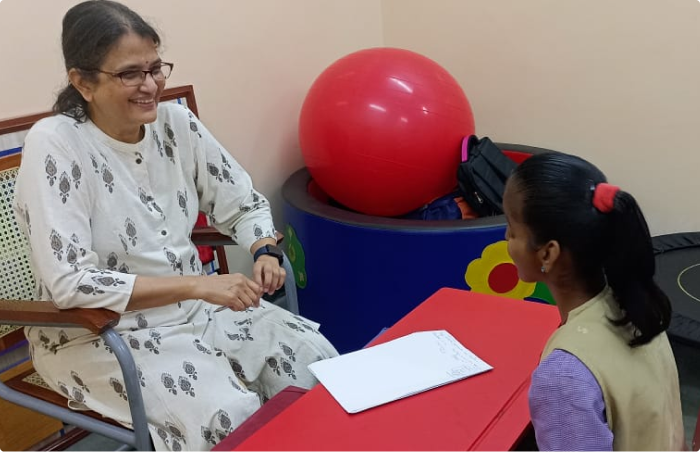Building Resilience: A Guide for Families with Special Needs
– By Iyyappan Subramaniyan
Parenting a child with special needs is both a joyful and challenging journey. While these children possess unique abilities, they face specific difficulties that require specialized care. Psychological counseling is one of the key rehabilitation pillars offering vital support for both children and their families.
Empowering Parents through Psychological Counseling
Parents of children with special needs face a unique set of challenges not faced by other parents. They often carry heavy emotional burdens, including guilt, anxiety, and isolation. Trained professionals can guide them through these often-overlooked areas.
- Emotional health: Parents often worry about their child’s future, health, and well-being. The unpredictability of their child’s condition can cause anxiety and fear. Some parents may even blame themselves, leading to feelings of guilt and inadequacy.
- Self-care: Parents often prioritize their child’s needs over their own, neglecting their own well-being. This leads to burnout and emotional exhaustion.
- Adjusting to changing needs and expectations: As the child grows, their needs and challenges may change, requiring parents to constantly adapt and adjust. Parents also grieve the loss of their idealized expectations for their child’s future.
- Social support: Many parents feel isolated and misunderstood by friends and family. Caring for their children can sometimes limit their social interactions and personal time.
- Healthcare systems: Navigating medical appointments, therapies, and insurance claims can be overwhelming for these families. The added financial burden of specialized treatments and therapies further compounds their stress.
Psychological counseling provides parents a safe space to process their emotions, develop coping strategies, and build resilience. It also enhances family communication, strengthens relationships with healthcare providers, and helps set realistic goals for both the child and the family.
Motivating Children through Psychological Counseling
Psychological counseling can help children develop good coping mechanisms, improve their social skills, and boost their self-esteem. By addressing specific challenges like anxiety, depression, and/or behavioral issues, counseling meaningfully improves their quality of life.
- Emotional regulation and coping skills: Counselors can help children recognize, understand, and manage complex emotions, teaching them techniques like deep breathing, mindfulness, and creative expression. They also empower children to face challenges with a positive outlook, fostering a sense of control.
- Cognitive development: Counselors can guide children in breaking down problems into smaller steps, consider different solutions, and make better decisions. They employ techniques to improve attention span and concentration, such as mindfulness exercises or structured activities. Through games, puzzles, and other activities, counselors encourage a child’s cognitive development and critical thinking skills.
- Behavioral management: Counselors can help identify and address the root causes of challenging behaviors. They teach alternative, positive behaviors to replace negative ones, promoting self-control and appropriate conduct. Counselors collaborate with parents and educators to create individualized behavior plans that address a child’s specific needs.
- Social skills and relationships: Counselors work on verbal and nonverbal communication skills, helping children express needs and understand social cues. They guide them in developing friendships, resolving conflicts, and engaging in cooperative play. By practicing social skills in a supportive environment, children gain confidence in their abilities to interact with others.
- Family support and education: Counselors can offer advice and support to parents and caregivers, helping them understand their child’s specific needs and challenges. They provide information about conditions, coping strategies, and available resources. Counselors create a safe space for open communication within the family, thereby building a strong support system.
Current Best Practices in Psychological Counseling
- Individual therapy is tailored to the specific needs of the child or parent. It provides a one-on-one setting to explore thoughts, feelings, and behaviors.
- Family therapy involves the entire family in the therapeutic process. This fosters open communication that improves a family’s dynamics as a support system.
- Cognitive-behavioral therapy (CBT) helps individuals identify and modify negative thought patterns and behaviors.
- Acceptance and commitment therapy (ACT) helps individuals accept their thoughts and feelings, and commit to taking action towards their values.
- Play therapy is a child-centered therapy technique that uses play to express emotions, build self-esteem, and develop social skills.
- Parent training and support groups provide parents with practical strategies, coping mechanisms, and a supportive community of peers.
Psychological Counseling in India
Mental health issues, including those affecting children with special needs, are increasingly prevalent in India. However, access to quality mental healthcare remains a significant challenge particularly for families with special needs. While awareness of psychological counseling is growing, there’s still much to be done. Specific foundations dedicated to mental health for people with disabilities are limited but a few organizations are addressing this intersectional issue.
- National Institute of Mental Health Rehabilitation (NIMHR) focuses on promoting mental health rehabilitation using an integrated multidisciplinary approach. The organization develops trained professionals, including those who specialize in working with people with disabilities.
- National Institute of Mental Health and Neurosciences (NIMHANS) focuses on research, teaching, and clinical services in mental health and neurosciences. The organization provides specialized care for individuals with mental health conditions and disabilities, often working in collaboration with other organizations.
- The MINDS Foundation provides mental health education and accessible care. The organization offers counseling and therapy services, often adapting their approach to accommodate specific needs.
- Sangath focuses on research-based interventions for mental health conditions, including those affecting people with disabilities. The organization develops and implements programs that address the unique challenges faced by individuals with disabilities, such as communication barriers and limited access to services.
- The Banyan focuses on comprehensive care for people with mental illness. The organization provides healthcare and rehabilitation in a range of institutional and community settings encompassing inpatient, residential, and community-based services.
- Sri Arunodayam Charitable Trust focuses on research-based therapy for the children in its care with mental health conditions. They develop and implement integrated counseling and therapy programs, enabling them to offer comprehensive rehabilitation and reintegration services.
How Can We Integrate Mental Health Into Primary Care?
Incorporating mental health services into primary healthcare settings can enable early intervention and treatment. Here are key government strategies:
Capacity Building and Training
- Train and equip primary care providers such as physicians, nurses, and other healthcare providers with the necessary skills to identify, assess, and manage common mental health conditions.
- Provide mental health first aid training to community members, teachers, and other frontline workers to recognize signs of mental health distress and provide initial support.
Task Shifting and Sharing
- Utilize non-specialist healthcare workers, such as community health workers, to screen for mental health conditions and provide basic psychosocial interventions.
- Collaborate with mental health specialists by establishing referral systems to connect patients with specialized mental health services when needed.
Develop Integrated Mental Health Services
- Integrate mental health services into existing primary care clinics to ensure seamless access for patients.
- Create community mental health centers to provide a range of services, including counseling, medication management, and psychosocial rehabilitation.
Stigma Reduction and Awareness Campaigns
- Promote mental health literacy through public awareness campaigns to reduce stigma and encourage help-seeking behavior.
- Collaborate with community leaders and influencers to spread positive messages about mental health.
Utilize Technology
- Leverage technology to provide remote mental health services, especially in rural and underserved areas.
- Develop user-friendly mobile apps to offer self-help tools, symptom tracking, and access to mental health information.
Policy and Programmatic Interventions
- Strengthen the National Mental Health Program by allocating adequate resources and prioritizing mental health integration.
- Develop clear guidelines and protocols for identifying, assessing, and managing mental health conditions in primary care settings.
Psychological counseling is a powerful tool that can meaningfully improve the lives of parents and children with special needs. As India continues to evolve, it is imperative that the government prioritizes mental health and provides accessible, affordable, and high-quality psychological counseling services at every level of care. By investing in mental health, we can reduce the burden of mental illness and create a more compassionate and inclusive society for everyone.
Reference
- National Institute of Mental Health Rehabilitation (NIMHR) – https://nimhr.nic.in/
- National Institute of Mental Health and Neurosciences (NIMHANS) – https://nimhans.ac.in/
- The MINDS Foundation – https://www.mindsfoundation.org/
- Sangath – https://www.sangath.in/
- The Banyan – https://thebanyan.org/
- Sri Arunodayam – https://sriarunodayam.org/
- The information provided in this blog is intended for general knowledge and informational purposes only, and does not constitute professional advice. The opinions, information, and conclusions contained should not be construed as conclusive fact or as an indication of future results.
Summary
India is gradually shedding the stigma associated with mental health, and psychological counseling has emerged as a vital tool to address these concerns. It empowers individuals to navigate life’s challenges, build resilience, and achieve optimal well-being.
This blog delves into the multifaceted benefits of psychological counseling, particularly for families with special needs. By exploring and managing behavioral issues, managing stress and anxiety, and overcoming learning difficulties and communication challenges, psychological counseling can provide invaluable support in building strong family relationships. Evidence-based therapies and new collaborative care models are enabling tailored interventions that are helping families in their quest for fulfilling and balanced lives.
Tags
Psychological counseling
Special needs
Mental health
Child development
Family support
Rehabilitation therapy
Autism
ADHD
Down syndrome
Cerebral palsy
Intellectual disability
National mental health program
Integrated mental health services
Family therapy
Cognitive-behavioral therapy (CBT)
Play therapy

